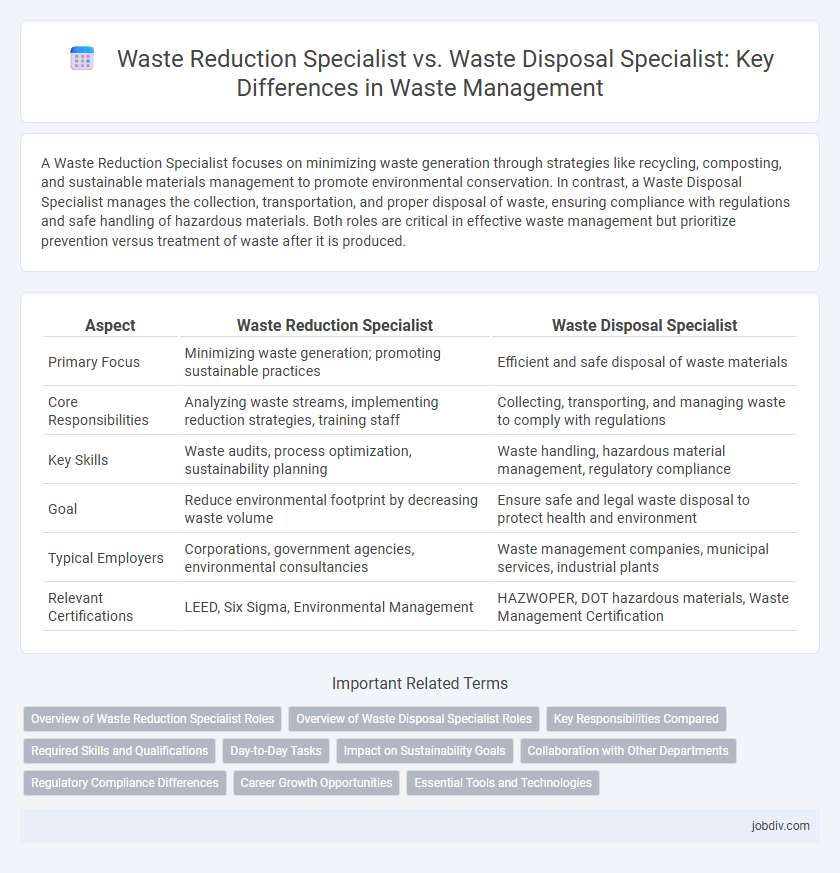A Waste Reduction Specialist focuses on minimizing waste generation through strategies like recycling, composting, and sustainable materials management to promote environmental conservation. In contrast, a Waste Disposal Specialist manages the collection, transportation, and proper disposal of waste, ensuring compliance with regulations and safe handling of hazardous materials. Both roles are critical in effective waste management but prioritize prevention versus treatment of waste after it is produced.
Table of Comparison
| Aspect | Waste Reduction Specialist | Waste Disposal Specialist |
|---|---|---|
| Primary Focus | Minimizing waste generation; promoting sustainable practices | Efficient and safe disposal of waste materials |
| Core Responsibilities | Analyzing waste streams, implementing reduction strategies, training staff | Collecting, transporting, and managing waste to comply with regulations |
| Key Skills | Waste audits, process optimization, sustainability planning | Waste handling, hazardous material management, regulatory compliance |
| Goal | Reduce environmental footprint by decreasing waste volume | Ensure safe and legal waste disposal to protect health and environment |
| Typical Employers | Corporations, government agencies, environmental consultancies | Waste management companies, municipal services, industrial plants |
| Relevant Certifications | LEED, Six Sigma, Environmental Management | HAZWOPER, DOT hazardous materials, Waste Management Certification |
Overview of Waste Reduction Specialist Roles
Waste Reduction Specialists focus on minimizing waste generation through strategies such as recycling programs, material reuse, and sustainable resource management. They analyze waste streams and implement policies designed to reduce environmental impact while promoting cost efficiency. Their role emphasizes proactive prevention, contrasting with Waste Disposal Specialists who manage the safe removal and treatment of waste after it is generated.
Overview of Waste Disposal Specialist Roles
Waste Disposal Specialists manage the safe and compliant removal, transport, and processing of waste materials, ensuring adherence to environmental regulations and public health standards. Their responsibilities include sorting waste streams, operating disposal equipment, and maintaining records for hazardous and non-hazardous waste disposal. Expertise in regulatory compliance and waste treatment technologies distinguishes their role from Waste Reduction Specialists, who focus more on minimizing waste generation at the source.
Key Responsibilities Compared
A Waste Reduction Specialist focuses on developing and implementing strategies to minimize waste generation by promoting recycling, composting, and sustainable practices within organizations or communities. In contrast, a Waste Disposal Specialist manages the safe and efficient collection, transportation, and processing of waste materials to ensure proper disposal according to environmental regulations. Both roles contribute to waste management but differ in approach, with the former emphasizing prevention and the latter emphasizing handling and removal.
Required Skills and Qualifications
A Waste Reduction Specialist requires expertise in sustainability practices, data analysis, and environmental regulations to develop strategies that minimize waste generation and promote recycling initiatives. Key qualifications include knowledge of resource management, proficiency in conducting waste audits, and strong communication skills to collaborate with stakeholders on reducing waste at the source. In contrast, a Waste Disposal Specialist focuses on safe handling, transportation, and disposal of waste materials, necessitating skills in hazardous waste management, adherence to safety protocols, and certification in waste management practices.
Day-to-Day Tasks
A Waste Reduction Specialist analyzes materials flow and implements strategies to minimize waste generation, focusing on recycling programs, resource efficiency, and sustainability initiatives. In contrast, a Waste Disposal Specialist manages the collection, transportation, and proper disposal of waste, ensuring compliance with environmental regulations and safety protocols. Both roles collaborate to optimize waste management but differ in their emphasis on prevention versus disposal operations.
Impact on Sustainability Goals
A Waste Reduction Specialist drives sustainability by implementing strategies that minimize waste generation, enhancing resource efficiency and reducing environmental impact. In contrast, a Waste Disposal Specialist focuses on the safe and compliant removal of waste, ensuring proper handling and preventing pollution. Both roles are critical, but Waste Reduction Specialists have a greater direct impact on achieving long-term sustainability goals by promoting waste prevention and circular economy practices.
Collaboration with Other Departments
Waste Reduction Specialists collaborate closely with sustainability teams, procurement, and production departments to implement strategies that minimize waste generation at the source. Waste Disposal Specialists coordinate with environmental compliance, logistics, and safety departments to ensure proper handling, storage, and removal of waste materials according to regulatory standards. Effective collaboration between these specialists and multiple departments enhances overall waste management efficiency and supports corporate environmental goals.
Regulatory Compliance Differences
Waste Reduction Specialists prioritize minimizing waste generation through sustainable practices, ensuring compliance with regulations like the Resource Conservation and Recovery Act (RCRA) that promote waste prevention and recycling. Waste Disposal Specialists focus on proper handling, treatment, and disposal of waste, adhering strictly to regulatory requirements related to hazardous waste management and landfill operations. The key regulatory compliance difference lies in waste reduction strategies emphasizing prevention versus waste disposal ensuring safe and lawful elimination.
Career Growth Opportunities
A Waste Reduction Specialist typically experiences faster career growth by focusing on sustainability strategies and regulatory compliance, areas increasingly prioritized by industries worldwide. Waste Disposal Specialists often advance through technical skill enhancement and operational management within waste treatment facilities, but their career trajectory may be more limited compared to the expanding roles in waste reduction and environmental impact mitigation. Opportunities for Waste Reduction Specialists include roles in policy development, corporate sustainability, and environmental consulting, reflecting market demand for innovative waste minimization solutions.
Essential Tools and Technologies
Waste Reduction Specialists utilize data analytics software, lifecycle assessment tools, and composting technologies to minimize waste generation and promote sustainable practices. Waste Disposal Specialists rely on heavy machinery, hazardous waste containment systems, and advanced incineration or landfill management technologies to safely manage and dispose of waste. Both roles increasingly incorporate IoT sensors and GPS tracking systems to enhance efficiency and regulatory compliance in waste management operations.
Waste Reduction Specialist vs Waste Disposal Specialist Infographic

 jobdiv.com
jobdiv.com